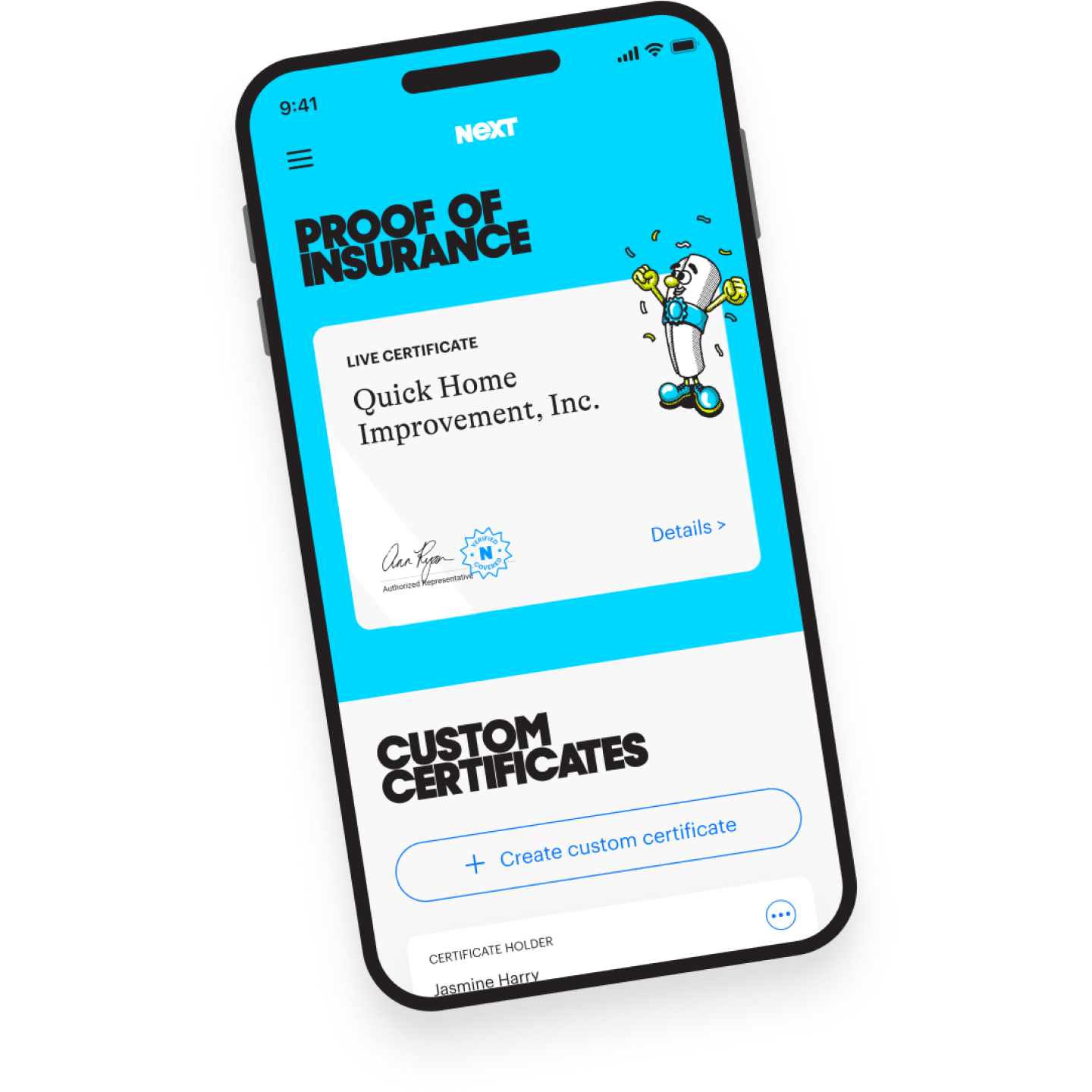Workers’ Compensation Insurance
Protect your employees and your business.
Choose your primary industry to get started:
Workers’ compensation can help protect your employees and your business after a workplace injury or illness. It can help pay for:
Medical expenses
Includes examinations, treatments and rehabilitation.
Lost wages
Gives employees time to recover from an injury before returning to work.
Survivor benefits
Supports families by helping to cover funeral costs and income replacement.
Retraining
Helps employees who need to learn skills and enter a new field.
Permanent injury
Provides benefits for employees who can no longer work due to injury.
Employers liability
Protects your business from financial losses if an employee files a lawsuit against you.
Learn more about Workers’ Comp insurance:
Workers’ compensation can help cover expenses for medical care, lost wages and other costs after a workplace injury or work-related illness. This coverage is sometimes called workman’s compensation insurance or workman’s comp.
What is Workers’ Compensation insurance?
Workers’ comp is required business insurance in most states for businesses with employees. Even if it’s not required in your state, it can help cover some of the costs if an employee is hurt on the job or suffers a work-related illness.
Workers’ comp can help protect business owners from significant financial losses, including lawsuits and expenses related to medical costs, lost wages while employees recover, some on-the-job retaining, and costs associated with permanent injury and death.
Without insurance, the employer could be responsible for all related costs, which could add up to tens of thousands of dollars.
Is Workers’ Comp insurance required by law?
Business owners in most states are legally required to have workers’ compensation coverage if they have employees. However, the laws are different in each state.
Even when it’s not required by law, many business owners buy coverage for financial protection if an employee experiences a work-related injury or illness. Workers’ comp can also help protect business owners themselves if they add business owner’s coverage to their policy.
You might be required to have coverage to get a license or permit
Workers’ comp may also be required to get a license for some professions.
If you need to quickly obtain coverage to satisfy a license or bid requirement, you can get covered with NEXT in about 10 minutes and instantly access your certificate of insurance (proof of insurance) at no additional cost.
What does Workers’ Comp cover?
Workers’ comp can help cover employee medical bills and other related expenses after work-related injuries.
Workers’ compensation claims can help pay for:
- Medical expenses
- Lost wages
- Job retraining
- Permanent injury benefits
- Survivor benefits and death benefits
- Employers liability
Does Workers’ Comp offer coverage for employee lawsuits?
The employer liability coverage offered with workers’ compensation insurance can help protect your business from financial losses if an employee sues you for causing a workplace injury or illness.
It can include coverage for several different types of lawsuits, including negligence.
What’s not covered by Workers’ Comp?
Workers’ compensation benefits provide many important financial protections, but it’s not the only type of insurance business owners buy.
Here are some other types of business insurance that might be helpful for your business:
- General liability insurance can help provide coverage for injuries to people who are not employees and damage that your business causes to property that doesn't belong to you.
- Commercial property insurance can help protect the physical things you need for business, including inventory, products, fixtures, equipment and building structures.
- BOP insurance (Business Owner’s Policy) combines the protections of both general liability and commercial property into a single, often more cost-effective, policy to cover common business risks.
- Professional liability insurance could provide financial protection if you’re accused of making a professional mistake that costs someone else money.
- Commercial auto insurance can provide protection if you or your employees drive for work.
Who needs Workers’ Compensation insurance?
Most businesses with employees need workers’ compensation. It’s required by law in most states. But even if it’s not, it's a good idea for business owners to help avoid potentially large financial losses.
Learn more about specific workers’ comp needs for different types of businesses:
- Workers’ comp for Restaurants and Food Service
- Workers’ comp for Retail
- Workers’ comp for Cleaning and Janitorial
- Workers’ comp for Construction
- Workers’ comp for Contractors
Do I need Workers’ Comp if I’m self-employed?
A common misconception about workers’ comp is that it’s only for businesses that have employees.
In fact, optional workers’ comp coverage for self-employed workers, sole proprietors and independent contractors can provide financial protection and help meet contract requirements with clients.
If you don’t have workers’ comp and you are injured at work, you also might not be covered by your personal health insurance. It’s important to read your policy documents carefully to make sure you are protected.
How much does Workers’ Compensation cost?
Several factors determine the cost of workers’ compensation insurance, including:
- The number of employees at your business
- Your payroll
- Location of your business
- Your business operations
- The job functions of your employees
- Claims history
If you’re exposed to more risk, you typically pay more for insurance, regardless if you’re purchasing workers’ comp coverage or another type of business insurance.
How to get Workers’ Comp insurance with NEXT
You can get an insurance quote and purchase coverage in about 10 minutes — 100% online — and customize an insurance package to meet your needs.
Start a free instant quote. We’ll ask some questions about your business, including:
- The type of work you do
- Where you do business
- The type of business you own and how many years you’ve been in business
- Your number of employees
- Total payroll
- The work your employees do
If you have any questions about the process or your coverage options, our licensed U.S.-based insurance advisors are ready to help.
You can save time and up to 10% by bundling other types of business insurance with your workers’ compensation policy. (Note: Coverage and discount eligibility may vary from state to state).
How to file a Workers’ Comp claim
You can file a claim anytime and from anywhere online or in the NEXT app.
You’ll be asked to share the details of what happened, and for relevant photos and documentation.
We strive to make claims decisions quickly so you can get back to work.
Compare Workers’ Compensation insurance
Learn how workers’ comp stacks up against other insurance coverages:
Workers’ Compensation FAQ
If you don't find the answers you’re looking for, our licensed insurance advisors are standing by to help.
Does Workers’ Compensation cover business interruption?
Worker’s compensation does not cover business interruption.
Business income interruption is a type of property insurance that covers the loss of income that a business suffers after an unexpected event, such as a fire or snow storm. It is included in NEXT’s commercial property coverage.
Does Workers’ Compensation cover my subcontractors?
Workers’ compensation generally does not cover subcontractors because they are not your employees.
However, in some states for some industries, subcontractors may be classified as your employees if they don't carry their own workers compensation.
In that case, you must report their payroll as your employees.
I'm the owner of the company. Am I covered by Workers’ Compensation if I'm injured on the job?
Injuries to business owners can be covered by optional business owners’ coverage in workers’ comp.
If you’re the owner of the company and you trip and break your hand at your work site, you could be eligible to get help with your medical bills and lost wages.
Personal health insurance might not cover medical fees for work-related injuries — especially if you’re in the construction industry — so getting workers’ comp for yourself as a business owner can offer you an extra layer of protection.
Who is exempt from Workers’ Compensation insurance?
Every state except for Texas requires workers’ comp for employees.
However, each state also typically has a short list for who is exempt from coverage. It’s important to check the insurance requirements where you work.
Some states don’t require the insurance for certain types of workers, such as:
- Agricultural employees
- Domestic workers
- Real estate employees
- Coaches for children’s sports team
Be sure to check the exemptions in your state.
Do business owners without employees need to buy Workers’ Compensation?
If you’re a business owner without employees, you may not be required by law to have workers’ compensation, particularly if you’re a sole proprietor, partner or LLC member.
However, that might not be the case for more regulated industries, such as construction.
Even if it’s not legally required, you could still be asked by your clients for proof of insurance. A certificate of insurance for workers’ comp lets clients know you have coverage if you get injured while working for them.
Do contractors need Workers’ Compensation insurance for themselves?
If you’re a sole proprietor or independent contractor without any employees, you usually aren’t required by law to get workers’ comp.
However, the construction industry is often regulated differently and you might be required to have coverage before you take a job.
Regardless if it’s required by law, it can be a good idea to have an active workman’s comp policy. If you get sick or injured on the job, workers’ comp can help cover medical bills and some of your lost wages.
If you’re a sole proprietor or independent contractor with employees, you may need to get workers’ compensation for them.
Learn more about workers’ compensation for contractors.
What’s the difference between Workers’ Compensation and disability insurance?
Workers’ compensation provides financial help for injuries that happen at work or work-related illnesses.
Disability insurance usually covers injuries that happen outside of work.
It’s the employer’s responsibility to pay for workers’ compensation insurance, and it’s usually required by law.
Disability insurance is typically optional and costs are often shared between the employer and employee.
Learn more about the differences between workers’ compensation and disability insurance.
Does Workers’ Compensation pay disability benefits?
Workers’ comp benefits are separate and distinct from disability benefits.
If a work injury results in a permanent injury that renders you unable to return to work, workers’ comp may pay some kind of permanent injury benefits, but it varies from state to state.
You’ll need a workers’ compensation doctor to verify that your disability was caused by your work conditions, and that your disability is not going to improve. This is called “maximum medical improvement,” or MMI.
If an employee injures themselves after lifting too many heavy boxes at your moving company and can’t work anymore, a doctor will rate the disability (stated as a percentage) and determine the degree of permanent limitation.
Permanent total disability means you can’t return to work at all in any field.
Permanent partial disability refers to a lasting impairment that sticks around after the initial injury or illness, such as hearing loss. These types of cases are common workers’ comp injuries.
How is Workers’ Compensation different from health insurance?
Workers’ compensation can cover medical expenses and lost wages after an accident at the workplace.
Health insurance usually covers personal injuries and ailments that happen outside of work.
Health insurance can cover many of your medical expenses, but it won’t cover any lost wages while you’re recovering after a workplace injury.
Learn more about the differences between workers’ comp and health insurance.
Get customized insurance wherever you do business
Learn more about workers’ compensation insurance options in the state where you work.
NEXT Insurance reviews
General Insurance & Worker's Comp
The service I've received from Next is great. I am looking forward them adding automobile policies to the roster.
Samuel B.
Very easy to do business with!
Next is very easy to do business with. The sign up was easy, the payment system is fast and easy and they are reasonably priced.
Dainer B.
Company insurance
They got me several quotes within three minutes and I picked one and had my policy in place in the next few minutes I will always use them for all my insurance needs!
Dana R.
Easy fast coverage
It was easy to sign up. The price was right. I was able to email a certificate within minutes.
Russ D.
GL and workers comp
Fast reliable company with very competitive pricing
Nicholas S.
Thank you for making it
Thank you for making it so easy
angelo r.
Easy as pie
They had coverage for me in less than 15 mins. East to do. Awesome
Richard R.
Peace of mind
easy to apply and and customer service is very responsive
Darrell W.
Excellent
Good service, great prices for the coverages.
Chad S.
Simple and fair
Professional and easy
michael p.












